By Celeste Kennel-Shank Mennonite Weekly Review
 Scott Calkins hadn’t planned to be a church planter. But when he and his wife moved to Elkton, Md., they found no Mennonite churches within easy traveling distance.
Scott Calkins hadn’t planned to be a church planter. But when he and his wife moved to Elkton, Md., they found no Mennonite churches within easy traveling distance.
As he looked further, Calkins discovered there was little Mennonite presence in the rapidly developing area of northeastern Maryland and northern and central Delaware. So he decided to start Pax Min, a resource center for new Anabaptist churches focusing on community, simplicity and peace.
He started a church in Elkton he hopes will one day spawn others in the next several years.
“Maybe God had a hand in this, because here I am sitting in the center of where we want to be,” he said.
A group of Mennonite Church USA area conferences has taken notice of such opportunities for new churches in the mid-Atlantic. Regional Area Conference Leaders — representatives of Allegheny, Atlantic Coast, Eastern District, Franconia, Franklin and Lancaster conferences, sometimes joined by Virginia and New York conferences — began to talk in recent years about spreading an Anabaptist message along the East Coast.
“Several years ago, we named this initiative of church planting and leadership development as something we could do across conference lines,” said Warren Tyson, Atlantic Coast executive conference minister and Eastern District conference minister.
In November 2007, conference leaders put dots on a map of the East Coast and a map of Pennsylvania for each place where a new group was forming or conversing.
“It was such a delightful moment,” Tyson said. “Seven of our eight regional conferences represented put dots going from Virginia up into New England.”
When the group had finished, there were nearly 50 new initiatives, most of them started within the past three years and among a variety of cultures, he said.
“It feels like God is doing a new thing,” Tyson said. “There is church planting springing up in numerous locations.”
The May meeting of regional conference leaders brought pastors from some of the new churches to give reports and tell the conferences what they need. The group identified as challenges providing adequate support to new churches and hiring or reconfiguring staff, Tyson said.
Many of the church plants began without heavy financial investment or staff, he said.
That was the case for New Hope Fellowship of Alexandria, Va. Kirk and Marilyn Hanger had been planting churches in Mexico for 10 years with support from Franconia and Mennonite Mission Network before returning to the United States in 2003. A group of Mennonites to whom they were connected were meeting in Alexandria in member Marty Shupack’s home, and the Hangers joined the leadership.
 The congregation now meets in a school auditorium and includes nearly 100 people, about half of whom are Latino, and the rest mostly white or African from from Chad and Congo. Kirk Hanger is pastor and Marilyn Hanger is part of the worship team. Worship is in Spanish and English, with sermons translated through ear buds and music in both languages.
The congregation now meets in a school auditorium and includes nearly 100 people, about half of whom are Latino, and the rest mostly white or African from from Chad and Congo. Kirk Hanger is pastor and Marilyn Hanger is part of the worship team. Worship is in Spanish and English, with sermons translated through ear buds and music in both languages.
In a coffee shop in Alexandria, they described using the early church in Antioch as their model.
“My vision is to be a church that is reaching out in evangelism but also focused on compassion and peace and justice,” Kirk Hanger said.
The Hangers said being church planters requires trying multiple times until something works.
“It takes risks and stepping out in faith a lot,” Marilyn Hanger said.
In relating to conferences, Kirk Hanger likes the hands-off approach of many leaders. Kirk Hanger has his credentials with Franconia Conference, and has appreciated mentors there. He sees conference leaders as “helping to shape the vision, giving strategic counsel and advice, but not controlling,” he said.
Calkins, on the other hand, thinks the conferences have been slow to support new church development in his area.
“They have been good at lifting up people to established pulpits, but they haven’t been good at lifting up church planters,” said Calkins, who has worked with Lancaster and Atlantic Coast conferences.
Calkins believes his area of Maryland and Delaware is so ripe for church plants that it could one day form a new conference.
“The message the Anabaptists have been gifted with, the notion of peace, simplicity and community, is needed today,” he said.
Yet, in Calkins’ opinion, Mennonite church-growth strategy has too often focused on raising children in the faith.
“One of the things it does is make evangelism nearly impossible for outsiders,” said Calkins, a former Presbyterian pastor.
In both Presbyterian Church (U.S.A.) and MC USA, Calkins said he has been treated as a youth pastor, though he is now 40.
“A lot of the leadership is unwilling to step aside,” he said, allowing young leadership to come forward.
Joe Rosa, Lancaster conference’s resource for church planting, said support from conferences and agencies, as well as the strength of the leadership, is key. He has seen churches flourishing and planting new churches, with many of the church plants in his conference being Vietnamese, Ethiopian or Latin American.
“One of the strengths with the racial-ethnic churches is that they are younger churches,” he said.
That is also a challenge, because there are also many large families, most of whom are lower income, he said.
Beyond finances, Rosa said he has heard from church planters that they need connections and education. To that end, Lancaster Mennonite Conference offers training and seminars for church leaders.
Rosa sees another success in CONNECT, a church plant of West End Mennonite Fellowship in Lancaster, Pa.
“They constantly seek mentorship,” Rosa said.
Both congregations reach out to people who have felt rejected by traditional forms of church, said Josef Berthold of West End, as he sat in the worship space of West End’s bar-turned-church.
“The vision for CONNECT is that we see it as our responsibility to be the church to the world,” he said.
West End has been meeting for 10 years and has about 120 people on a Sunday. They asked themselves, “How do we grow without wanting to compromise the intimate setting?” Berthold said.
They decided to plant CONNECT, which has attracted about 25 people so far. CONNECT meets Sundays above Prince Street Cafe in Lancaster, and has events during the week as well. They are led by a pastoral leadership team. Lancaster conference has been a source of financial support and accountability, Berthold said.
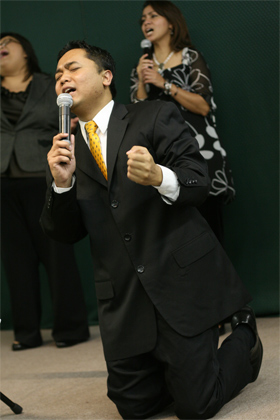 Beny Krisbianto, pastor of Nations Worship Center in Philadelphia, a Franconia congregation, received support from the conference to plant a church in Silver Spring, Md., about 18 months ago. Nations Worship Center members had relatives in the Washington, D.C., area, Krisbianto said.
Beny Krisbianto, pastor of Nations Worship Center in Philadelphia, a Franconia congregation, received support from the conference to plant a church in Silver Spring, Md., about 18 months ago. Nations Worship Center members had relatives in the Washington, D.C., area, Krisbianto said.
“One family becomes two or three families,” he said. “Now we have seven families committed with us.”
About 25 people gather for Friday prayer meetings in a home, he said. The group has also been having Saturday night events once a month, which they plan to do more often beginning in September. The Saturday night events have attracted as many as 300 people, Krisbianto said.
The services are in English and Indonesian, since there is a mix of second-generation Indonesian immigrants and those more recently arrived, such as Krisbianto, who came to the U.S. seven years ago. At the Saturday events they also invite people without a church home to come to the new congregation’s services.
“We pray that God will send some unchurched people,” he said.
Krisbianto planted a church in Iowa by himself several years ago. After moving to Philadelphia, he found the process to be much easier with the help of a church conference.
“The burden is relieved,” he said. “I see the progress quicker.”
He appreciated Franconia offering connections, financial support and prayer, he said. “We don’t just need the money, we need moral support,” he said.
Krisbianto also emphasized that when church planters feel discouraged, they should remember to rely on God’s grace.
“God will bring the people,” he said. “God will open the door.”
Reposted by permission from Mennonite Weekly Review. To read more go to www.mennoweekly.org
photos by Timoyer

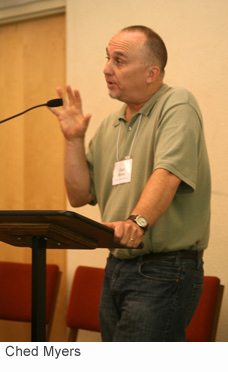 AKRON, Pa. — Sixty people from across Mennonite Church USA met last month in Akron, Pa., as part of a consultation focused on the theme Connecting with ‘old’ and ‘new’ Anabaptists. Ched Myers, Elaine Enns and John D. Roth were presenters.
AKRON, Pa. — Sixty people from across Mennonite Church USA met last month in Akron, Pa., as part of a consultation focused on the theme Connecting with ‘old’ and ‘new’ Anabaptists. Ched Myers, Elaine Enns and John D. Roth were presenters.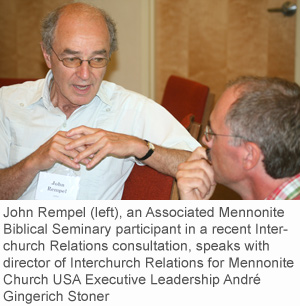 During the consultation, André Gingerich Stoner, director of Interchurch Relations for Mennonite Church USA Executive Leadership, presented a staff report on ongoing interchurch initiatives. Major attention during the past years involved processing membership in Christian Churches Together. Other ongoing involvements include cultivating relationship with the Pentecostal denomination,
During the consultation, André Gingerich Stoner, director of Interchurch Relations for Mennonite Church USA Executive Leadership, presented a staff report on ongoing interchurch initiatives. Major attention during the past years involved processing membership in Christian Churches Together. Other ongoing involvements include cultivating relationship with the Pentecostal denomination, 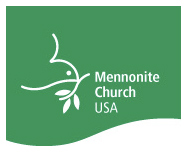
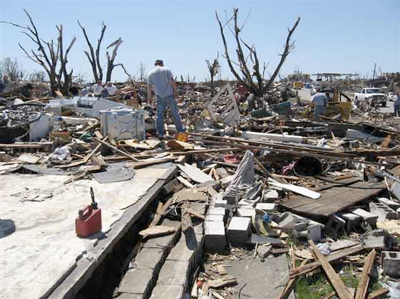


 The 2008 graduating class at
The 2008 graduating class at  by Laura Lehman Amstutz
by Laura Lehman Amstutz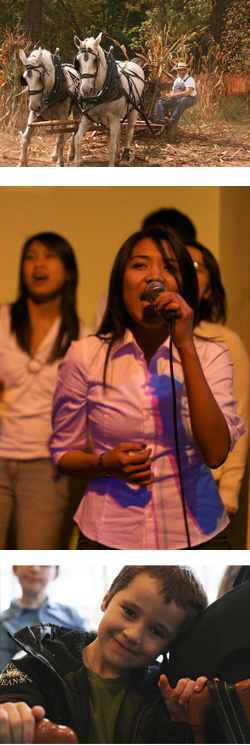
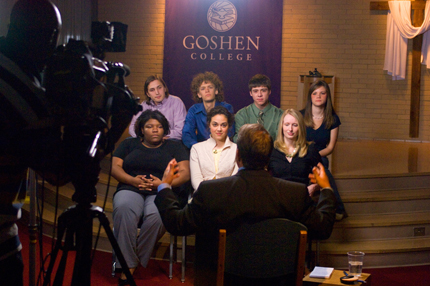
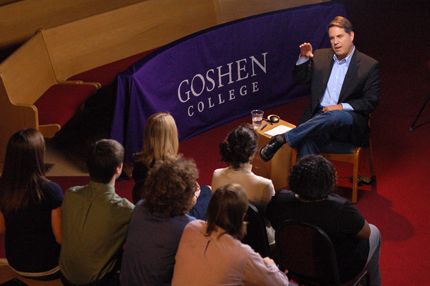 It wasn’t until a few days later, when the college sent out an email about the opportunity to be interviewed by a national news network for a series on young voters, that he made the connection. Good responded to the email and was one of seven students selected to be a part of the panel.
It wasn’t until a few days later, when the college sent out an email about the opportunity to be interviewed by a national news network for a series on young voters, that he made the connection. Good responded to the email and was one of seven students selected to be a part of the panel.